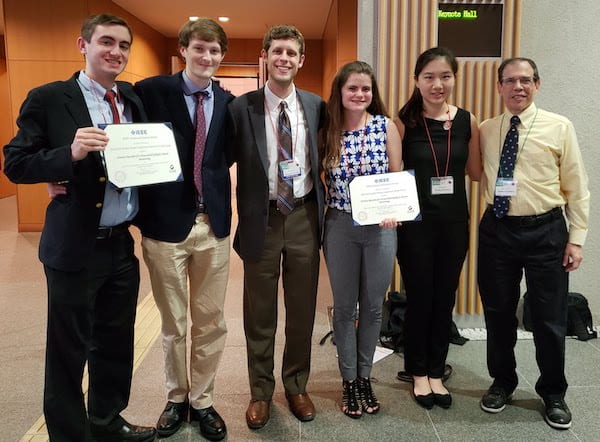Axon Mobile team tops international competition at IEEE circuits and systems symposium
Rice University students who invented a device to give patients with intractable epilepsy more freedom to move have won first prize in a student competition at the IEEE International Symposium on Circuits and Systems in Sapporo, Japan.
The Axon Mobile team was invited to compete against four others after being named winner of the North American division. The members — junior Aidan Curtis and seniors Sophia D’Amico, Andres Gomez, Benjamin Klimko and Zhiyang Zhang, all electrical and computer engineering majors at Rice’s Brown School of Engineering — developed an instrument to gather signals from a patient’s brain and send them wirelessly for analysis.

Rice University engineering students who developed a wireless recorder for intracranial epileptic seizure monitoring won the top prize at the IEEE Circuits and Systems Society student design competition in Sapporo, Japan. From left are students Andres Gomez, Aidan Curtis, Benjamin Klimko, Sophia D’Amico, and Zhiyang Zhang, and Joe Cavallaro, a Rice professor of electrical and computer engineering and of computer science. Photo courtesy of Joe Cavallaro
Rice University engineering students who developed a wireless recorder for intracranial epileptic seizure monitoring won the top prize at the IEEE Circuits and Systems Society student design competition in Sapporo, Japan. From left are students Andres Gomez, Aidan Curtis, Benjamin Klimko, Sophia D’Amico, and Zhiyang Zhang, and Joe Cavallaro, a Rice professor of electrical and computer engineering and of computer science. Photo courtesy of Joe Cavallaro
Their goal is to untether patients who, while being monitored for seizures, must now remain bound to a computer that collects data from wires implanted in their brains. Because these patients are not helped by medication, they sometimes have small parts of the brain where seizures originate surgically removed. Data taken during seizures helps doctors pinpoint the location, but the process can take weeks.
Competing teams were from China, the United Arab Emirates, Indonesia and Brazil.
The Rice team was nominated for the Circuits and Systems Society regional competition by faculty members Joseph Cavallaro, a professor of electrical and computer engineering and of computer science, and Gary Woods, a professor in the practice of computer technology and electrical and computer engineering. Cavallaro chairs the Houston chapter of the society and was in Japan with the team.
The students were advised by Dr. Nitin Tandon, a professor of neurosurgery at the McGovern Medical School at The University of Texas Health Science Center at Houston (UTHealth), and Caleb Kemere, an assistant professor of electrical and computer engineering at Rice. Tracy Volz, a Rice professor in the practice and director of the Engineering Communications Program, coached the team on its presentation.
Cavallaro said the IEEE, Dean Reginald DesRoches, the Oshman Engineering Design Kitchen, the Department of Electrical and Computer Engineering’s Bybee Travel Fund and Tandon funded the students’ travel.
Their presentation was broadcast via Facebook and remains available for viewing here: https://www.facebook.com/ieeecas/videos/336696273709955/

